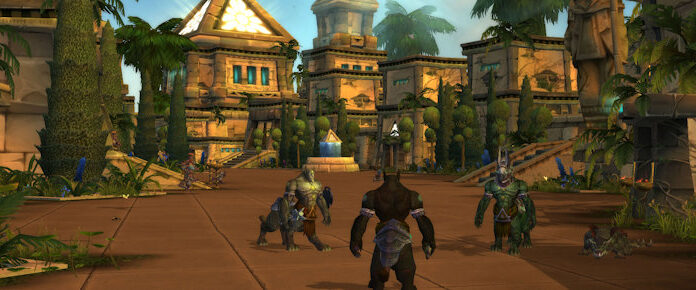
The use of the word “toon” to describe MMORPG characters is a contentious one, with fans divided over its annoyance or acceptance. But when it came to one MMORPG, it was nothing but proper terminology to call all characters just this.
Toontown Online was one of those “kiddie MMOs” that you probably ignored unless you happen to fall within its demographical clutches back in the day. While it lasted for about a decade, the game’s operation would be notable for its repeated transformation and uncertain status.
With a silly, cartoon-like look and theme, this MMO attempted to bring a levity to a genre that was often marinating in deep fantasy lore and statistical theorycrafting. But when you wanted to eschew dragon fighting for slapstick pie throwing, there was no better game out there. Let’s take a look!
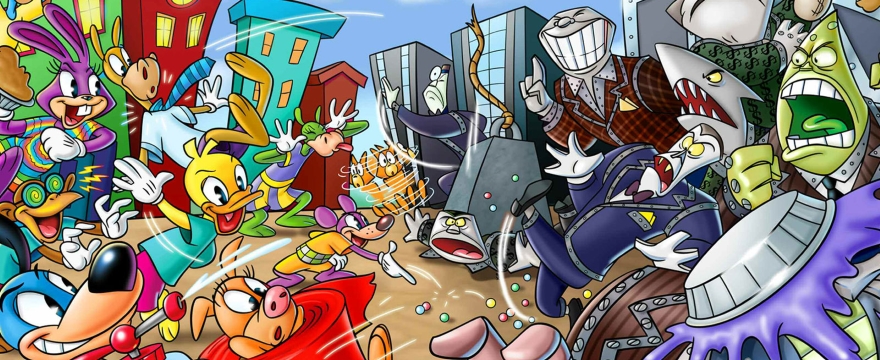
M.I.C.K.E.Y. MMO.U.S.E.
The year 2003 witnessed an explosion of MMORPGs that had been in development after the first generation of graphical MMOs rose to such prominence in the late 1990s. Tucked among Star Wars Galaxies, EVE Online, Shadowbane, Lineage II, and PlanetSide was an odd little title from the Mouse House itself.
Disney had been looking to take its brand online since 1996 (with the proposed yet never-developed HercWorld). Around that time, one Imagineer named Jesse Schell created a virtual game of tag between Mickey and friends as a proof-of-concept that gained traction among the company. Disney’s Internet Zone at its Epcot theme park incorporated the Toontag game for a decade and led to the idea of a family-friendly online game that would be safe and fun for all ages.
The pitch that the internal team gave to its higher-ups was that of a “Massively Multiplayer Online Theme Park,” which obviously appealed to Disney’s sensibilities. But the “20 MMOs in one” concept was too expensive — to the tune of $100 million — and so the team started working on an Atlantis: The Lost Empire MMO as an alternative. This project didn’t make it to launch (fortunately, considering that the movie floundered at the box office), and the team moved on to creating a town full of cartoon characters in the vein of the movie Who Framed Roger Rabbit? With about six million dollars budgeted, Toontown began production in 2000.
Having run its beta (or “sneak peek”) since late 2002, Toontown Online was ready to go prime time with its launch on June 2nd, 2003. Disney Online marketed the game as a “non-violent” alternative to other MMOs that incorporated the experience from Disney’s famous theme park Imagineers.
“We made Toontown a place for everyone, much like our theme parks, so it would appeal to a mass audience. In addition, and in the tradition of the Disney theme parks, this online attraction will grow over time, continuously offering our guests an ever-changing adventure,” said Managing Director Ken Goldstein.
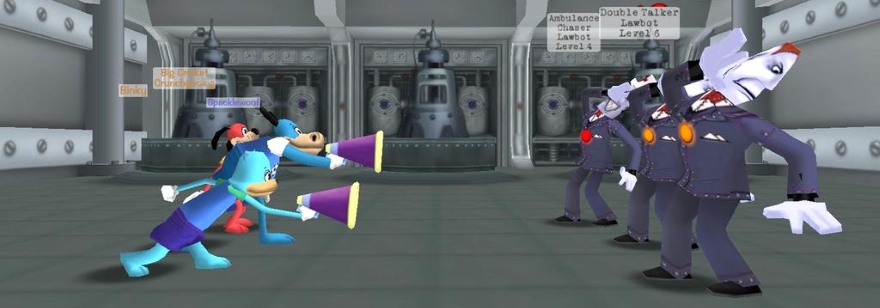
A cartoony community
In the game, players would take on the role of colorful Toons who were attempting to defend their town against soulless “Cogs” — robots who wanted to turn everything into dull grey structures. The only way to fight back was to employ slapstick gags as weapons, such as spritzers, megaphones, or good ol’ fashioned pies in a turn-based showdown. Either the Toons would prevail with their hilarity or the Cogs would overwhelm them with sadness.
Housing, parties, and minigames were also par for the course when a player Toon didn’t want to go out to tackle the Cogs. Interestingly enough, while the game was an official Disney product and featured several licensed characters, the player Toons themselves looked like they came straight from the Looney Toons library.
Toontown Online was specifically designed to encourage players to be social and varied in their activities. They had to farm jellybeans from minigames to purchase gags for combat, and to play those minigames and progress in fights, they needed friends.
“It was almost a religious thing with us: If this is going to be an online game, everything about it should be about playing with other people,” said Schell.
ToonFest and SpeedChat
While no massive hit, Toontown Online nevertheless became a modest success both critically (it was awarded “MMORPG of the Year” in 2003 by Computer Gaming World) and among its growing crowd of fans.
A subscription fee of $9.95 a month kept the title somewhat affordable for families and kids, and a “safe” communication system called SpeedChat. In design, SpeedChat would select pre-made sentences to keep kids from getting harassed, and grouping could only happen if kids exchanged special codes in-person with their friends. Not surprisingly, players found a way to pass out these codes in game even so, arranging housing decorations to form the letters and numbers.
Sony Online Entertainment, a major player in the MMORPG market in the 2000s, got in on the action in 2005. A subsidiary of SOE called Platform Publishing helped to get Toontown Online to retail shelves in an attempt to grow the game’s market. By 2006, 15 million characters had been created for the game.
To its credit, Disney threw a lot of support behind Toontown Online, including hosting a couple of player conventions that it called ToonFest. The first ToonFest was staged in 2006 and got a major publicity bump by the Disney Channel, with a second festival to follow in 2007. Another cool event was an in-game charity event in 2004 in which players recovered Cog-captured buildings to raise money for the Starlight Starbright Children’s Foundation.
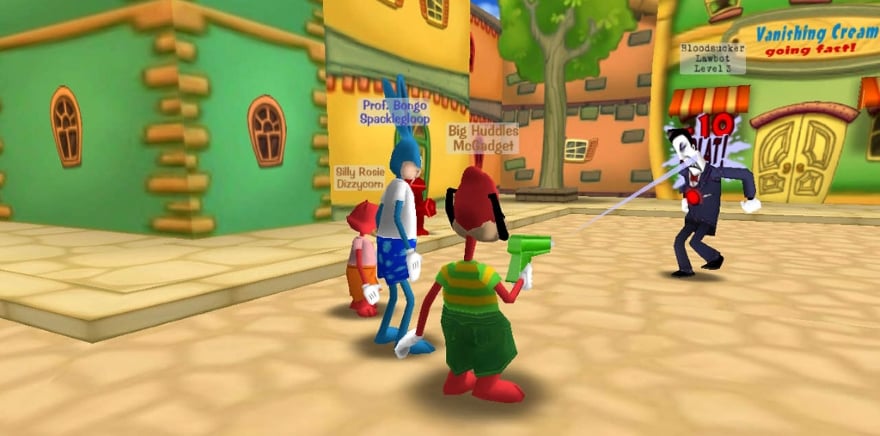
The end (or is it?)
The long-running MMO stumbled to a halt on September 19th, 2013, almost 10 years after it first released. No specific reason save that of “shifting development” from Disney was given for the closure, although the company encouraged players to check out its other titles (such as Club Penguin).
CNN put the blame for the shutdown on Toontown Online’s declining population but reported that thousands of players had signed a petition to get Disney to change its mind. The news outlet noted that the game had a special significance to certain gamers: “Because Toontown was a family game open to anyone seven and older, many of its more dedicated users started as children and grew into young adults while playing the game, making it an integral part of their childhood.”
It wasn’t as though Disney was trying to ditch and forget about Toontown Online entirely, however. Rumor was that the title wasn’t making enough money in its current format, and whispers of a mobile port surfaced soon after the shutdown. As of today, any further plans with the game have yet to be unveiled.
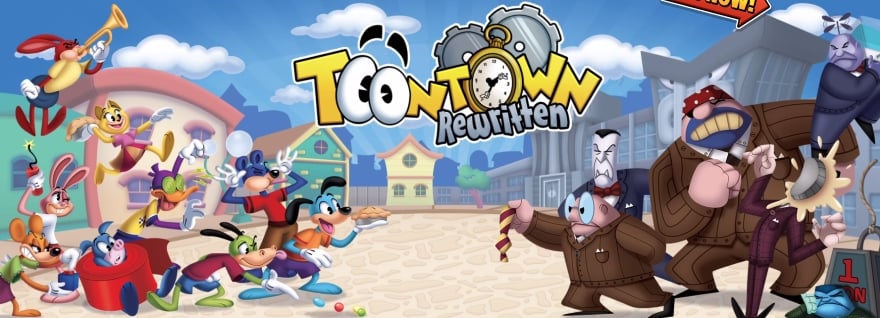
Toontown Rewritten
Not willing to let a good thing die, the Toontown fan community gathered the perishing title into its arms and breathed a single word in its ear: “Emulator.” This, mere months after Toontown Online was canceled, Toontown Rewritten started alpha testing.
“We know that it has been a long time since we originally promised the Toontown Rewritten alpha, however we do have good reason for the delays,” the project team posted in October 2013. “The more we worked on Toontown Rewritten, the more we saw that this game is severely outdated and needs a big rework. These past three months we have been setting groundwork to make sure that this game is not only revived, but revived so that it will last.”
This hard work paid off, as Toontown Rewritten progressed through alpha, beta, and finally launch. The fan emulator, which publicly distances itself from the Disney moniker, has been running and delivering new content for four years now.
It really goes to show that you never know how certain MMOs can make a lasting imprint in the minds and hearts of fans and how these games can become virtual homes that players never want to leave.
 Believe it or not, MMOs did exist prior to World of Warcraft! Every two weeks, The Game Archaeologist looks back at classic online games and their history to learn a thing or two about where the industry came from… and where it might be heading.
Believe it or not, MMOs did exist prior to World of Warcraft! Every two weeks, The Game Archaeologist looks back at classic online games and their history to learn a thing or two about where the industry came from… and where it might be heading.
